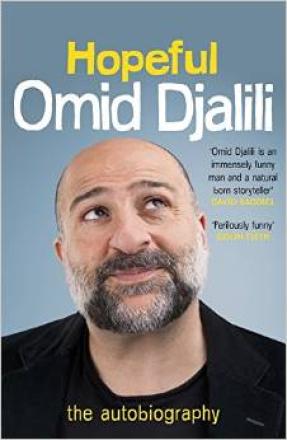
This autumn we are no doubt going to be drowning in the usual pre-Xmas autobiographies of comedians. So it is canny that Omid Djalili has got in first with Hopeful. Fans of Djalili’s stand-up shows may recognise the title as a variant of one of his old jokes: "My parents named me Omid, which means ‘hope’. Unfortunately, Djalili means ‘less’”.
Anyone buying the eminently engaging book hoping to learn about Djalili’s stand-up career, however, will be disappointed. Apart from a scene-setting introduction where he is doing an early calamitously comic gig at the Bearcat Club there are few references to his illustrious gag-telling oeuvre. One could easily be reading the story of a successful stage/TV/film star who occasionally dipped their toes into the comedy world.
This may be frustrating for comedy fans, but on the plus side we do get to learn about Djalili’s fascinating pre-fame life, in particular his time growing up in West London when his Iranian parents took in lodgers and there seemed to be an eccentric figure reading a book or writing a book in every nook and cranny of his flat. A running theme is the portrait of the artist as an outsider looking for a way to fit in: “I felt like a minority, within a minority, within a minority”.
Elsewhere there are big hints dropped into the narrative about this passionate Chelsea fan's future career. There is the moment when he got himself out of a hole by making the school bullies laugh. There is the moment when he was told he should be an entertainer. And there is the neediness that all comedians have. He realised he had a narcissistic streak almost before he knew what a camera was.
There are also outright laugh-out-loud comic passages, such as a childhood cesspit incident which – a testament to strong writing - is funny despite being able to see what is obviously coming, There are more serious moments too, such as tackling the 1979 Iranian Revolution and the time when he was a student in Ireland and his cockiness almost got him kneecapped. By contrast there is the romantic wooing of his wife Annabel. Djalili is nothing if not persistent, waiting for her on a date outside Charing Cross station long after others would have given up and gone home.
And maybe that is the secret of his success. Djalili charts various failures along the way – mostly academic – but what comes through in Hopeful is his determination never to give up despite the knockbacks. Obviously a fair bit of talent has helped too.
Buy Hopeful here.



